Picto Diary - 21 January 2016 (PM) - Glenburn Tea Estate
PM at Glenburn Tea Estate, 21 January 2016, some members of the Margaret Taylor Dance Troupe traveling in India, took a walk around the tea estate. The hour long walk/hike encompassed homes of the workers, tea bushes, and more than a few good bird shots (sent under separate cover - especially the green magpie!).
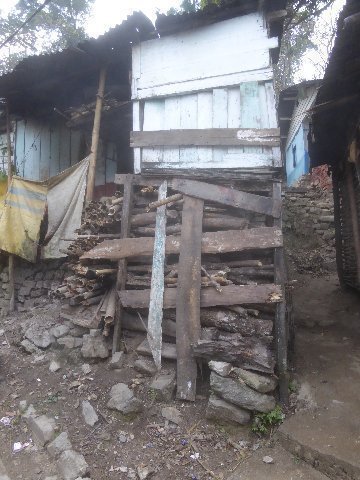
Above: Foundation of logs. Worker residence. Glenburn Tea Estate. Darjeeling, West Bengal, India. 21 January 2016.
I wonder if a municipal building permit was obtained?
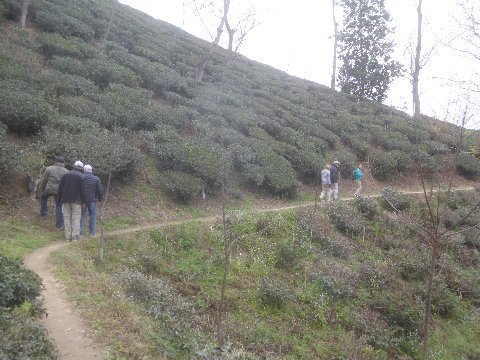
Above: Margaret Taylor Dance Troupe walking through the Darjeeling tea bushes, led by Lilima. Glenburn Tea Estate. Darjeeling, West Bengal, India. 21 January 206.
Glenburn is at 7000 feet of elevation. About the same as Park City. It snows only occasionally, but tea growth can be disrupted by freeze... occasionally happens, not often.
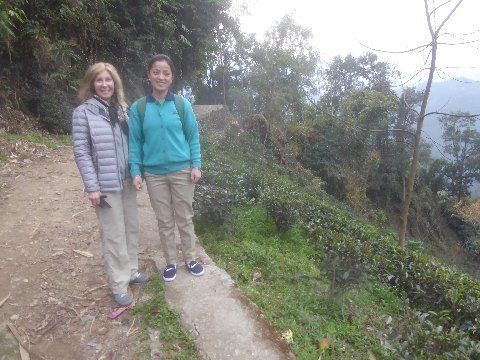
Above: Spago and Lilima, our hiking guide. Glenburn Tea Estate. Darjeeling, West Bengal, India. 21 January 2016.
Lilima guided some members of the Margaret Taylor Dance Troupe on an hour long walk/hike (we covered about 200 vertical feet of descent and ascent... not bad) around the tea estate.
Lilima is a fifth generation Nepali resident of Glenburn.
Lilima was educated at the plantation's expense at a Catholic School where she studied exclusively in English. She went to a public high school in Darjeeling where she studied in Nepali and Hindi, as well as English.
Lilima has a bright, eye contact, smile She spoke English well, albeit accented,...even well enough to banter a bit. Many who speak English otherwise well don't have a good sense of the colloquialisms, double entendre, and non-verbal communication of Americans. Take the Japanese, as a group of English speakers (strugglers?) for one. Lilima was a communicator advanced beyond basic English knowledge.
She acknowledged that many of the young people do not want to stay and work the tea plantation. She, however, said that she had a pretty good job at the plantation and, for now, was happy there. Most girls who stay on the tea plantation marry, in arranged marriages, at the age of 17. They go on to do as their mother's did... move in with the husband's family and work the tea fields.
Lilima said she was 26, and had no interest in marrying in the traditional way. She was proud of her Catholic education. She said she was quite happy in her current job though it was clear that he education accomplishment, poise, level of world awareness was such that she would have opportunity in "the big city," should she want to take the chance.
Likely, engaging with foreign visitors, as she is doing with us, is a deliberate part of her effort to broaden her horizons.
There are 700 or so employees of the tea picking and processing business. The boutique hotel employs 52. You always get coddled staying in Indian hotels. Hotel labor costs are low and excellent service is ubiquitous.
There are two spins on running a tea plantation the way it is done here.. ie. a multigenerational history of tea workers being supported by the company. Meager wages, but basics... home, rice, blankets, and schooling provided. Ie. slave labor?
On the other hand, India's economy burgeons, well educated children of tea workers, whose education was paid for by the tea plantation, see opportunity, and "leave the farm."
The tea plantation must now look to different sources of labor and/or technology to continue tea production. Capitalism. Isn't this the way its supposed to work? Rising tide raises all boats?
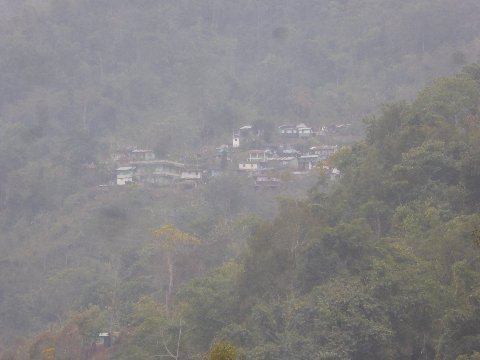
Above: Village where Lilima lives. Glenburn Tea Estate. West Bengal, India. 21 January 2016.
Image captured, telephoto, I would estimate to be two kilometers distant with a 500 foot vertical climb/descent from the spot where the image is captured... from the spot in the tea bushes where Lilima stands with members of the Margaret Taylor Dance Troupe traveling in India.
Lilima affirmed that she walked two and from work at the tea plantation headquarters.
Struggle. That's the first word that came to mind when I had heard Lilima's story. Lilima was raised in the poorest of families, but, took advantage of company offered schooling opportunities to get a solid education. She was putting her learning to work as a guide of international visitors, building her knowledge of the world, AND, she walked/hiked daily about 3 miles, and 500 vertical feet, to get to and from work!
Many kids in America, born into families of economic advantage or privilege, bright, good students though they may be, don't struggle, in a real sense. In fact, many parents today attempt to reduce struggle by their children when they complain that their kids school gives too much homework. As the world shrinks... becomes more integrated in markets and communication... (800 hundred millions Indians now own a cell phone) people like Lilima, who know "struggle," will work harder, in knowledge positions, for less compensation than coddled western kids. In a world sense, struggling Lilima is the future. Non struggling Americans are in for a comeuppance.
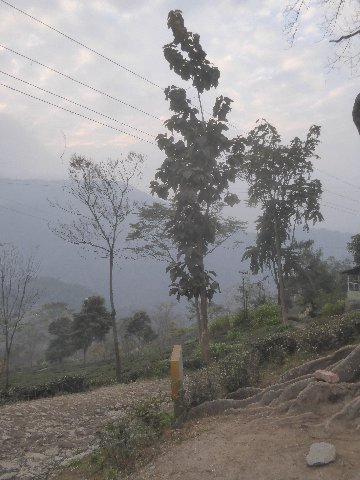
Above: Teak tree. Glenburn Tea Estate. Darjeeling, West Bengal, India. 21 January 2016.
Rare, desirable wood, ubiquitous here.
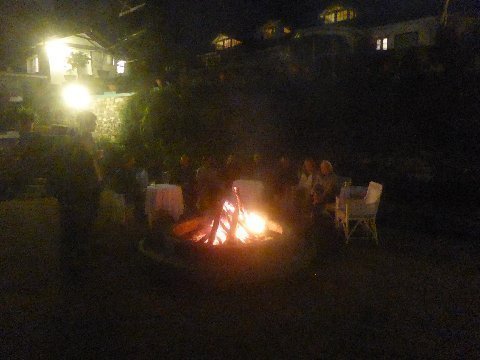
Above: Cocktails by the fire. Glenburn Tea Estate. Darjeeling, West Bengal, India. 21 January 2016.
Glenburn Tea Estate managers a young British couple (Faye and Will), note that they are fully booked... and that they get business by word of mouth.
The owners of Glenburn are owners of the premises that Citibank occupies on Chowringhee Road in Kolkota. We met the Glenburn owners during our visit to Kolkata last year, learned of their boutique hotel tea estate and signed up for a visit the next (this) year.
http://www.glenburnteaestate.com/
We have not been disappointed. This is a unique, off the beaten track, travel experience.
Sadly, because the atmosphere was misty, we missed vistas of the nearby Himalyan peaks. Kangchenjunga, the world's 3rd highest mountain, is visible from Glenburn on a clear day. Check the above website for some good images of Kangchenjunga. We'll have to go back!
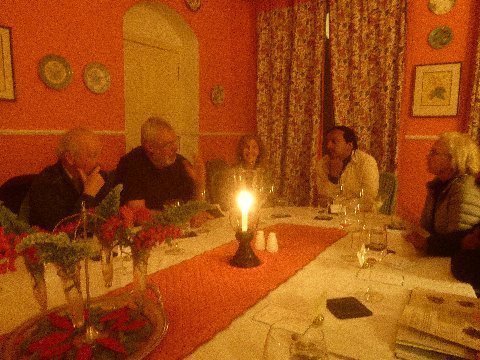
Above: Dinner. Glenburn Tea Estate. Darjeeling, West Bengal, India. 21 January 2016.
Left to right: Montage, The Bishop, Spago, Perveez (GM of tea production), and TIMDT.
Food is excellent. Tonight was Burmese fare.
Addendum:
“Never Become Negligent”
What a concept!
Love all your posts and pics.
Thank you. Our hero!
Inventor,
Park City, UT